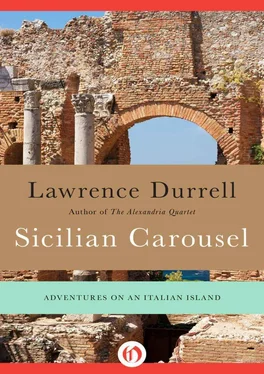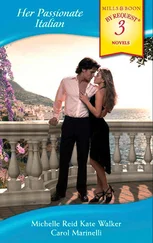I think his little homily must have sounded a trifle reproachful for all at once everyone — almost everyone — decided to get out and walk a bit, as if to atone for our slack philistinism. However morally worthy, as a gesture it was somewhat intrepid because of the heat beating down from the rocks and vales. We were far from the sea here and the valley gathered up the rays of sunlight like a green burning glass. Nevertheless we set off in a straggle, I with Deeds and Roberto; we were shortly joined by the Count who was a good amateur botanist and was collecting wild flowers and leaves to press in the pages of his Goethe. “You know,” he said, “I am very skeptical about our attitude to the past; I don’t believe that we have a shadow of an inkling about how a Greek thought. Understanding and sympathy need a common culture. We are so different that it is idle to pretend that we can for a moment appreciate what their attitude to life and death was. I think we fake the whole thing. Fake reverence. Fake understanding. No, it has all disappeared once and for all; there is no way of recovering such a remote past by the imagination. Do I depress you?” We assured him stoutly that he did not, but in fact he did. I felt suddenly the fatigue of this journey growing upon me — the fatigue of the speed which did not give time to take in enough. A brilliant butterfly sat on a leaf. And suddenly I felt nothing but pure hate for the Carousel.
On we pressed in the heat, bursting with vainglory and good intentions, anxious to do the honest thing by one of the most beautiful ancient Greek theaters in existence when there came an encounter so hubris punishing as to be worthy of some ancient Greek fable. Beside the road, upon a large rock, sat a couple of very fragile and very ancient people, obviously a man and his wife, both older than the rock upon which they perched. The man was of an incomparable distinction from every point of view — worn but excellent light tweeds, gillie’s hat, light cape, solid gold-handled walking stick.… He looked like a senior Druid. His wife was beautiful and silver and fragile, a fitting mate for a man so handsome, whose silver hair spoke of age and serenity, but whose old eyes spoke of culture. Moreover, a lunch basket lay open between them, and she was in the act of reading from a book — it sounded like ancient Greek in an Erasmic pronunciation.

GRECIAN TEMPLE AT SEGESTA
Suddenly we appeared round the corner, puffing our noble way uphill; the reading stopped and the couple gazed at us with a quiet aristocratic commiseration. Scrutiny would be the word — a long cold scrutiny which made us aware of the extent to which we were disturbing the peace of this honeyed place. That wasn’t all. As we passed the old man spoke to his wife in a low clear voice, not intended to be overheard, and what he said was: “Poor tourist scum.” It was like machine gun fire — the whole front line wavered. We had been assailed in our poor fragile corporate identity; we had been weighed and found wanting. We could look at ourselves now with the proper misgiving and see just what a scruffy raggle-taggle mob we were, ill assorted and self-assertive with our little red bus. We felt suddenly terribly ashamed and full of self-pity. And here were these damned British aristocrats sniffing their contempt down their long aquiline supercilious noses. They had doubtless done things the right way — they had probably walked the last hundred miles, sleeping in the trees, and pausing from time to time to read select chunks of Theocritus or Thucydides to each other. Here they were, professionally appreciating the place in the right way while we, a sweaty mob of people of all shapes and sizes were galloping about destroying the peace.… I was furious, we were all furious, we were hopping mad. Hopping mad. Hopping.
Scum!
I did a fictive brood in the theater like everyone else, but this sudden criticism had disarmed and annihilated my composure. “How foolish to let a trifling barb like that irritate one.” (The theater was everything they said it was, and I resolved to come back and camp in the region next time.) But while only the English speakers of the party could have been winged by the small shot of the old British couple, there was a general sense of strain setting in, which could only have been due to travel fatigue. We were feeling the need to lie up in one place for a few days, to get everything into perspective. This much-needed breather would, of course, come when we reached Taormina. But as yet we had to face Palermo, and a long coastal stint as far as Messina before the end, the parting of the ways. But as if to taunt us for our lack of moral fiber the drive, when we once embarked on it, was one of the most beautiful yet, across rolling valleys, through sleeping-beauty towns. Skies domed and blue, fragile as pigeons’ eggs, liquid horizons where the sea clung to the edge of the world like a drop of silver. I dozed fitfully while the Microscopes had a bitter argument about something. The Count’s wife was really feeling pretty bad and there was some question as to whether they would not stay on a night or two in Palermo to recover enough strength for the rest of the journey. He had sat beside me in the theater and expressed some of his apprehension about his wife. “Since we lost our son she has been unable to regain an interest in life. She began to smoke and take tranquillizers and sleeping pills. She has ruined her health and now she can’t break the habit. I only came on this trip in the hope that it might shake her up and enable her to regain her health.”
Palazzi
Cool vegetation, ageless functionaries,
Winter palaces on slimy canals
Folded on green conservatories starred
With time, and all their forlorn flora,
Big dusty plants without their mistresses.
No challenge in the acres of dumb carpet
Sarcophagus of reception rooms groaning
“Who goes there?” You may well ask aloud.
Further on an artificial lake, forgetfulness.
Neither anguish nor joy obtains on it.
The ancient servant trembles as he points,
A corpse-propelling ninny with bad Parkinson’s
Croaks “Questa la casa” and the silence falls
Touched by the silver chime of clocks,
While soft as graphite or mauve plum pudding
The recent hills frame cities of the dead, Palermo.
A ND PALERMO, DESPITEthe fine presence of a colorful capital, exuded simply stress. It was everything that we had come to Sicily to get away from! Yes, the physical amenities were there, the hotel was large and comfortable; but there had been a strike of personnel and the beds were not made, while the meals had to be on the self-service pattern and luggage had to be man hauled into lifts. Inevitably there was a bit of irritation and Roberto, always sensitive, began to feel once more that everything was his fault. It was late evening when we got in and we were offered a chance to see a few of the night spots, such as Mentobello Beach, and while this was pleasant it was touched very heavily with the brush of Palm Beach or Torquay and for that reason did not specially enchant us. The lighting in the hotel was precarious and early in the evening, due to some unspecified contingency, the bath water gave out and an official communiqué assured that it would not be restored until the following morning. It may be imagined that this did not lead to rejoicing, and the more acrimonious among us (the French take the first prize for selfishness and bad temper in moments of crisis) became very angry with Roberto who had the bar specially opened (there was no barman) in order to try and mollify them. Mario offered us a short bus tour of the town but there were few takers — especially when it was discovered that this extramural trip would cost a small supplementary sum. The sniffs of the French could have been heard a mile off. What was one to do?
Читать дальше












